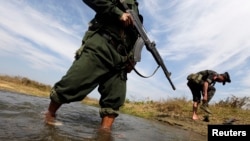A coalition of Burmese armed minority groups has agreed to continue a dialogue with the government to try to reach a nationwide cease-fire deal.
Representatives of 17 armed groups and the Burmese government ended two days of talks in northern Kachin state without any concrete agreements. But the two sides announced they will keep meeting, starting next month in the southern state of Karen.
In the latest talks in Kachin, the Burmese government presented a cease-fire proposal calling on all of the minority groups to give up their strategy of violent struggle.
Rebel negotiator Khun Okkar, of the United Nationalities Federal Council, said in an interview with VOA the government needs to include armed groups in the cease-fire drafting process.
"We suggest that if there will be an accord, both of us need to discuss it first," he said. "Now the government has put their own accord on the table and it becomes a draft. But, it was written by parliament, the military and the government. We want to write the draft together. That task will be handled by our [Nationwide Ceasefire Coordination] Team."
Armed ethnic groups had been fighting the military for decades until most of them agreed to unofficial truces in recent years. Seventeen of them participated in a conference last week, agreeing to negotiate with the government in a unified voice and seek a broader cease-fire to replace the individual truces.
Burmese government spokesman Hla Maung Shwe said the main the goal for his side is to begin a political dialogue with the armed groups.
"In this dialogue, we need to discuss two basic issues," he said. "One is the nationwide cease-fire and another is the framework of the meetings. Now we are preparing for a nationwide cease-fire. Ethnic groups are bringing their agreement [to negotiate in a unified voice] and the government also has its own cease-fire policy. We have to discuss it."
One issue raised in the two-day meeting was the structure of the Burmese military. The armed groups are calling for the creation of a federal military that integrates their forces but also gives them some autonomy from the central government.
Burma's 2008 constitution, adopted under the country's former military rulers, says there can only be one national armed forces system.
Representatives of 17 armed groups and the Burmese government ended two days of talks in northern Kachin state without any concrete agreements. But the two sides announced they will keep meeting, starting next month in the southern state of Karen.
In the latest talks in Kachin, the Burmese government presented a cease-fire proposal calling on all of the minority groups to give up their strategy of violent struggle.
Rebel negotiator Khun Okkar, of the United Nationalities Federal Council, said in an interview with VOA the government needs to include armed groups in the cease-fire drafting process.
"We suggest that if there will be an accord, both of us need to discuss it first," he said. "Now the government has put their own accord on the table and it becomes a draft. But, it was written by parliament, the military and the government. We want to write the draft together. That task will be handled by our [Nationwide Ceasefire Coordination] Team."
Armed ethnic groups had been fighting the military for decades until most of them agreed to unofficial truces in recent years. Seventeen of them participated in a conference last week, agreeing to negotiate with the government in a unified voice and seek a broader cease-fire to replace the individual truces.
Burmese government spokesman Hla Maung Shwe said the main the goal for his side is to begin a political dialogue with the armed groups.
"In this dialogue, we need to discuss two basic issues," he said. "One is the nationwide cease-fire and another is the framework of the meetings. Now we are preparing for a nationwide cease-fire. Ethnic groups are bringing their agreement [to negotiate in a unified voice] and the government also has its own cease-fire policy. We have to discuss it."
One issue raised in the two-day meeting was the structure of the Burmese military. The armed groups are calling for the creation of a federal military that integrates their forces but also gives them some autonomy from the central government.
Burma's 2008 constitution, adopted under the country's former military rulers, says there can only be one national armed forces system.
This report was produced in collaboration with the VOA Burmese service.





